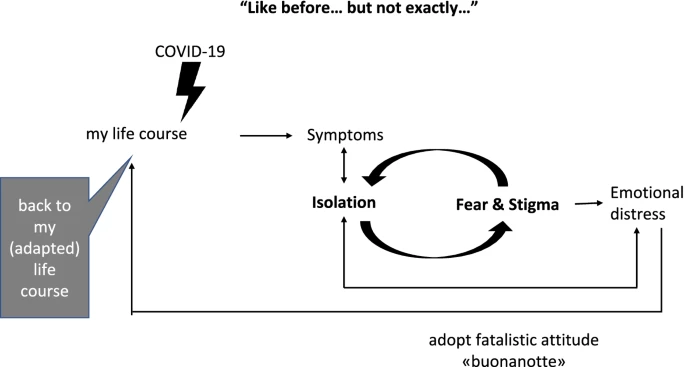Andy
Senior Member (Voting rights)
Abstract
Background
Post-acute sequelae of SARS-CoV-2 infection (PASC) affect millions of individuals worldwide. Rehabilitation interventions could support individuals during the recovery phase of COVID-19, but a comprehensive understanding of this new disease and its associated needs is crucial. This qualitative study investigated the experience of individuals who had been hospitalized for COVID-19, focusing on those needs and difficulties they perceived as most urgent.
Methods
This naturalistic qualitative study was part of a single-center mix-method cross-sectional study (REACT) conducted in Italy during the first peak of the SARS-CoV-2 pandemic. The qualitative data collection took place through a telephone interview conducted 3 months after hospital discharge. The experience of individuals discharged after hospitalization for COVID-19 was investigated through the main research question – “Tell me, how has it been going since you were discharged?”. Two secondary questions investigated symptoms, activities, and participation. Data were recorded and transcribed verbatim within 48 h. An empirical phenomenological approach was used by the researchers, who independently analyzed the data and, through consensus, developed an interpretative model to answer the research question. Translation occurred after data was analyzed.
Results
During the first peak of the COVID-19 pandemic, 784 individuals with COVID-19 were discharged from the hospitals of the Local Health Authority of the Province of Reggio Emilia (Italy); 446 were excluded due to the presence of acute or chronic conditions causing disability other than COVID-19 (n. 339), inability to participate in the study procedures (n. 56), insufficient medical documentation to allow for screening (n. 21), discharge to residential facilities (n. 25), and pregnancy (n. 5). Overall, 150 individuals consented to participate in the REACT study, and 56 individuals (60.7% male, average age 62.8 years ±11.8) were interviewed in June–July 2020, up to data saturation.
Persistent symptoms, feelings of isolation, fear and stigma, emotional distress, a fatalistic attitude, and return to (adapted) life course were the key themes that characterized the participants’ experience after hospital discharge.
Conclusions
The experience as narrated by the participants in this study confirms the persistence of symptoms described in PASC and highlights the sense of isolation and psychological distress. These phenomena may trigger a vicious circle, but the participants also reported adaptation processes that allowed them to gradually return to their life course. Whether all individuals are able to rapidly activate these mechanisms and whether rehabilitation can help to break this vicious circle by improving residual symptoms remain to be seen.
Open access, https://bmcpublichealth.biomedcentral.com/articles/10.1186/s12889-022-13035-w
Background
Post-acute sequelae of SARS-CoV-2 infection (PASC) affect millions of individuals worldwide. Rehabilitation interventions could support individuals during the recovery phase of COVID-19, but a comprehensive understanding of this new disease and its associated needs is crucial. This qualitative study investigated the experience of individuals who had been hospitalized for COVID-19, focusing on those needs and difficulties they perceived as most urgent.
Methods
This naturalistic qualitative study was part of a single-center mix-method cross-sectional study (REACT) conducted in Italy during the first peak of the SARS-CoV-2 pandemic. The qualitative data collection took place through a telephone interview conducted 3 months after hospital discharge. The experience of individuals discharged after hospitalization for COVID-19 was investigated through the main research question – “Tell me, how has it been going since you were discharged?”. Two secondary questions investigated symptoms, activities, and participation. Data were recorded and transcribed verbatim within 48 h. An empirical phenomenological approach was used by the researchers, who independently analyzed the data and, through consensus, developed an interpretative model to answer the research question. Translation occurred after data was analyzed.
Results
During the first peak of the COVID-19 pandemic, 784 individuals with COVID-19 were discharged from the hospitals of the Local Health Authority of the Province of Reggio Emilia (Italy); 446 were excluded due to the presence of acute or chronic conditions causing disability other than COVID-19 (n. 339), inability to participate in the study procedures (n. 56), insufficient medical documentation to allow for screening (n. 21), discharge to residential facilities (n. 25), and pregnancy (n. 5). Overall, 150 individuals consented to participate in the REACT study, and 56 individuals (60.7% male, average age 62.8 years ±11.8) were interviewed in June–July 2020, up to data saturation.
Persistent symptoms, feelings of isolation, fear and stigma, emotional distress, a fatalistic attitude, and return to (adapted) life course were the key themes that characterized the participants’ experience after hospital discharge.
Conclusions
The experience as narrated by the participants in this study confirms the persistence of symptoms described in PASC and highlights the sense of isolation and psychological distress. These phenomena may trigger a vicious circle, but the participants also reported adaptation processes that allowed them to gradually return to their life course. Whether all individuals are able to rapidly activate these mechanisms and whether rehabilitation can help to break this vicious circle by improving residual symptoms remain to be seen.
Open access, https://bmcpublichealth.biomedcentral.com/articles/10.1186/s12889-022-13035-w


